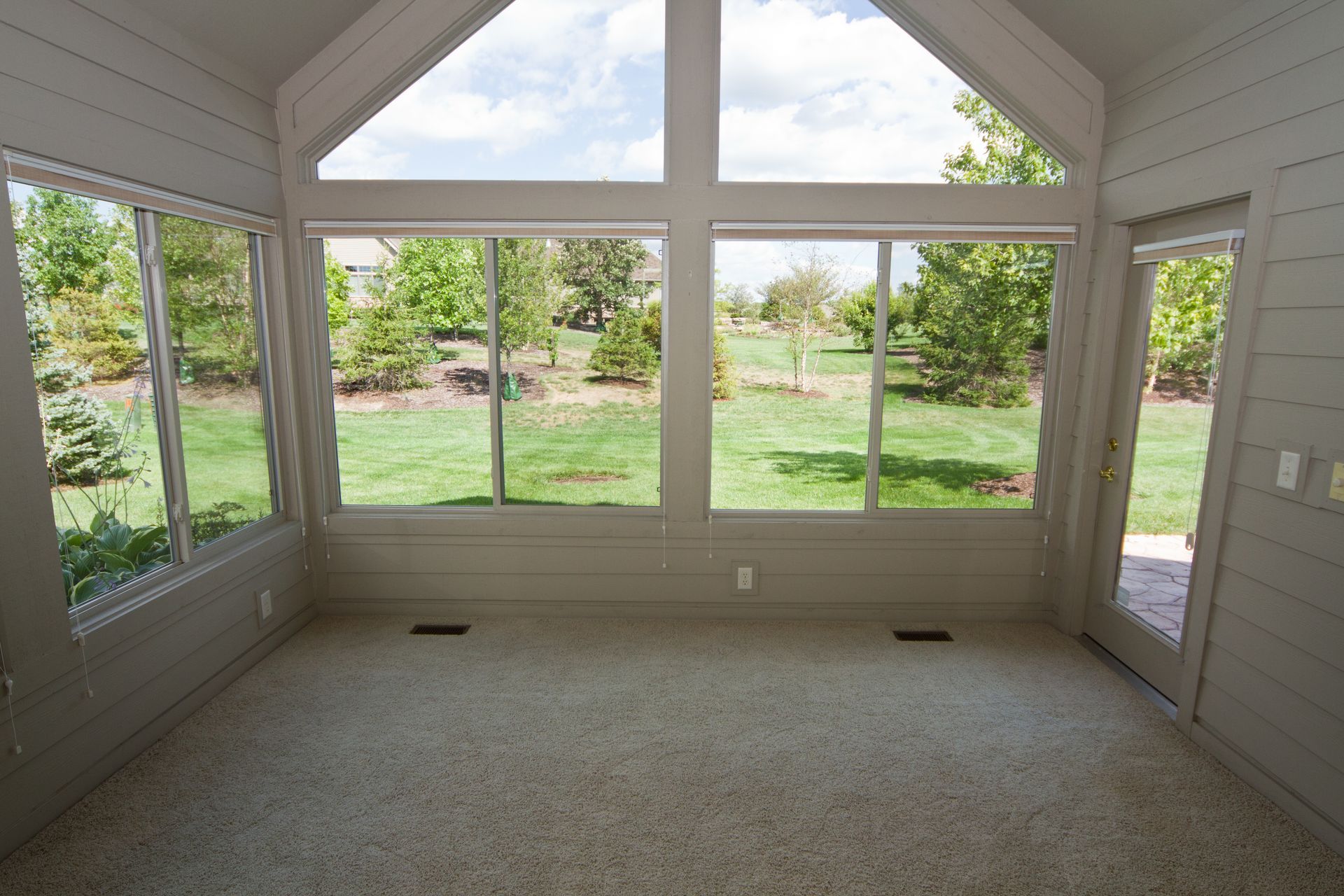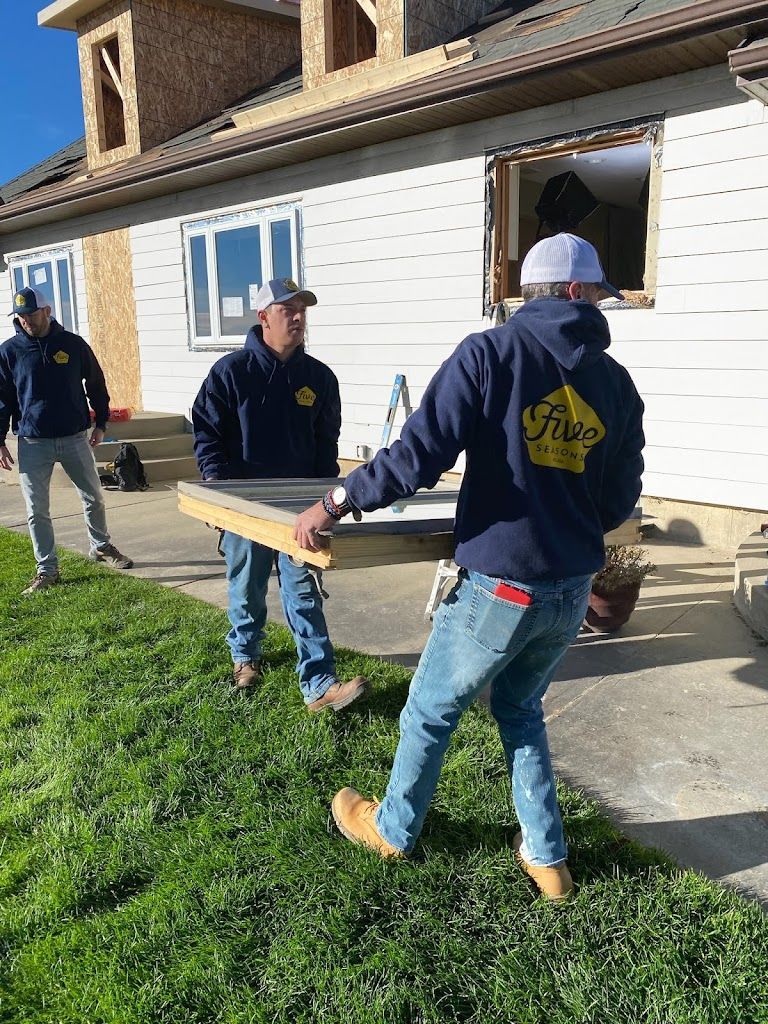Vinyl windows are durable enough for Colorado’s climate when made with reinforced frames, UV-resistant materials, and high-altitude-rated insulated glass. Their flexibility in freeze-thaw cycles and resistance to cracking or fading makes them one of the most reliable window materials for this environment. Studies show that modern vinyl windows with insulated frames and Low-E glass can reduce heat loss by up to 30% in cold climates while maintaining structural stability during extreme temperature swings.
Yes—high-quality vinyl windows are built to endure Colorado’s extreme conditions, from freezing winter temperatures to intense UV exposure and rapid seasonal changes. Designed with multi-chambered frames, weather-tight seals, and UV-resistant materials, they offer decades of performance with minimal upkeep. When installed properly, vinyl windows remain stable and energy-efficient even at high elevation.
In this article, we’ll break down how vinyl windows perform in Colorado's climate, why not all vinyl is equal, and what you should look for to get the most from your investment.
Why Colorado’s Climate Tests Window Durability
Colorado homes experience:
● Subzero winters and snow loads
● Intense UV exposure due to elevation
● Freeze-thaw cycles that expand and contract building materials
● Dry air that can dry out or shrink window components
● Frequent hail and wind in some regions
These conditions can cause seal failure, material warping, or frame cracking in inferior windows. That’s why material quality matters.
For more on why vinyl is a smart material overall for Colorado homes,
read our guide on why vinyl windows are a smart choice for Colorado homeowners.

What Makes Vinyl Durable—Or Not
Not all vinyl windows are created with the same quality standards—and in Colorado’s demanding climate, those differences matter. One important durability factor is the use of multi-chambered frames. These hollow compartments inside the frame add structural rigidity and help reduce flexing caused by rapid temperature changes. Welded corners are another strength feature; unlike mechanically joined frames, they resist separation over time and keep the window stable through years of expansion and contraction.
UV resistance is especially critical at high altitudes. Premium vinyl blends are formulated with stabilizers that prevent the material from fading, becoming brittle, or cracking after years of sun exposure. In addition, high-performance weather seals are essential. These components block wind, dust, and moisture from getting into your home—even when temperature swings are severe.
By contrast, cheap or single-extrusion vinyl windows often lack these reinforcements. They may degrade faster in Colorado’s dry, sun-exposed conditions. For the best durability, choose windows that are ENERGY STAR certified and come with a comprehensive structural warranty.
How Vinyl Windows Hold Up in Real Colorado Conditions
Well-made vinyl windows handle elevation, dry air, and thermal shock extremely well. Here’s how:
● Insulated glass units (IGUs) in high-quality vinyl windows use argon gas and Low-E coatings to manage pressure and reflect solar heat.
● Flexible framing allows vinyl to expand and contract without damage.
● Modern finishes resist fading and stay vibrant for decades.
In mountain homes and Front Range suburbs alike, vinyl windows have proven themselves in thousands of installations across Colorado.
Common Misconceptions About Vinyl Durability
“Vinyl cracks in cold weather.”
Poor-quality vinyl can, but modern blends remain flexible down to subzero temperatures.
“Vinyl windows look cheap.”
Newer designs offer clean lines, grid options, and wood-look finishes that match upscale exteriors.
“All vinyl is the same.”
No—frame thickness, reinforcement, and manufacturing quality vary widely. Stick with trusted brands and pro installation.
How Vinyl Windows Perform Year-Round in Colorado
Colorado’s weather swings sharply from season to season. Here’s how vinyl windows hold up across the calendar:
● Winter: Insulated frames and gas-filled glass help reduce heat loss, prevent condensation, and block cold drafts.
● Spring: Vinyl’s flexibility allows it to handle freeze-thaw cycles without cracking or warping.
● Summer: UV-resistant materials prevent fading and keep interiors cooler by reducing solar heat gain.
● Fall: Weather-tight seals protect against sudden cold snaps and prepare your home for winter.
This full-year performance helps homeowners stay comfortable and save energy no matter the season.
What to Ask When Shopping for Vinyl Windows in Colorado
Choosing vinyl windows in Colorado means more than just picking a style. Elevation, UV intensity, and freeze-thaw conditions require you to look beyond aesthetics and into how the window is built. Ask whether the frame design includes multi-chambered construction, which improves strength and insulation. Confirm whether the corners are fusion-welded—this enhances the frame's integrity and longevity.
You’ll also want to verify that the insulated glass unit (IGU) includes Low-E coatings and argon gas fill, as these features support energy performance at high altitudes. Don’t overlook the weatherstripping and seals; they should be specifically designed to resist drafts and air infiltration in dry climates. Finally, ensure the window and installation come with a reliable warranty that covers structural performance.
Knowing what to look for helps ensure you get windows that match Colorado’s performance needs. helps ensure you get windows that match Colorado’s performance needs.
Signs Your Current Vinyl Windows May Need Replacing
Even durable vinyl windows have a lifespan. Watch for these signs that yours may be nearing the end:
● Fogging or condensation between the panes (a sign of seal failure)
● Difficulty opening or closing windows due to warping or frame shift
● Noticeable drafts or rising utility bills
● Yellowing, cracking, or discoloration of the vinyl frame
● Loose seals or rattling during high winds
If you’re seeing these symptoms, it may be time to upgrade to newer, climate-ready models.
Vinyl vs. Other Materials in Colorado
| Material | Durability | Maintenance | Energy Efficiency | Cost |
|---|---|---|---|---|
| Vinyl | High | Very low | Excellent | Low |
| Fiberglass | Very high | Very low | Excellent | Mid–High |
| Wood | Moderate | High | Excellent (if maintained) | High |
| Aluminum | Moderate | Medium | Poor (without thermal break) | Mid |
Vinyl is a clear value leader for most Colorado homes, with fiberglass being a premium option.
How Long Do Vinyl Windows Really Last in Colorado?
When properly installed, vinyl windows typically last 20–30 years in Colorado homes. Their resistance to moisture, rot, corrosion, and UV damage means they hold up well against the elements.
How to Maximize Lifespan:
● Clean debris from tracks and weep holes annually
● Avoid applying dark tints or coatings unless designed for vinyl
● Hire qualified professionals for installation
Poor installs—not the material—are the biggest reason for early failure.

People Also Ask About Vinyl Window Durability in Colorado
Do vinyl windows hold up to snow and hail?
Yes. While hail can occasionally damage glass, high-quality vinyl frames are designed to resist cracking or denting. Reinforced frames and proper installation help these windows perform even in Colorado’s more severe weather patterns.
Can vinyl windows warp in Colorado heat?
Not if they’re manufactured with UV-resistant compounds and multi-chambered internal support. Vinyl windows engineered for high UV exposure remain stable even during long summer days in elevated areas like Colorado Springs or Boulder.
Are vinyl windows good for high altitudes?
Yes. Most quality vinyl windows come with insulated glass units (IGUs) that are specifically designed for high-altitude pressure changes. Features like capillary tubes or argon-filled IGUs prevent seal blowouts and maintain efficiency.
How do I know if my vinyl windows are failing?
Look for signs such as drafts near the frame, fogging or condensation between panes, or difficulty opening and closing. These symptoms often point to seal failure, warping, or frame fatigue—especially common in older or poorly installed units.
What affects vinyl window lifespan?
Several factors contribute, including product quality, sun exposure, color choice (dark frames absorb more heat), and the skill of the installer. Windows that are reinforced and professionally installed can easily last 25–30 years in Colorado’s climate.
Our Take: Why Vinyl Is a Reliable Long-Term Option
Vinyl windows are more than durable enough for Colorado’s climate—as long as you choose the right product and installer. With a lower cost of ownership, excellent insulation, and resistance to Colorado’s toughest elements, they provide dependable performance for decades.
At Five Seasons Windows and Doors, we guide homeowners toward vinyl windows that are engineered for the region and backed by real warranties.
Conclusion: Built to Withstand Colorado’s Climate
Colorado’s climate is demanding—but high-quality vinyl windows are up to the challenge. Choose wisely, install professionally, and your vinyl windows will reward you with comfort, durability, and long-term savings for years to come.
Get Started Today
Five Seasons Windows & Doors is Colorado’s top-rated local window company with 230+ 5-star reviews. We offer expert advice, no-pressure quotes, and flexible project options — including phased installs. Schedule your consult today.



